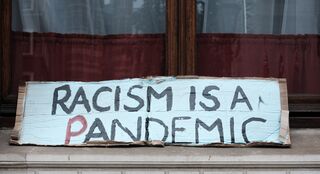Bias
How People in Power Have Fueled Hatred and Racism Against Asians
When leaders hide hate speech behind the veil of free speech.
Posted March 23, 2021 Reviewed by Abigail Fagan

As an Asian-American psychotherapist and speaker specializing in multicultural issues, I hear the real-world worries, anxieties, and fears of my Asian clientele about the increased vulnerabilities they face when going about their lives here in the United States.
Clients have shared stories of verbal slights, jabs, and outright hostility towards them in public. Some remain cloistered in their homes and limit public interaction to reduce their risk of being targeted.
It’s not hard to see why. Since the pandemic began, there’s been a surge of Asians worldwide reporting physical assaults, intimidation, bullying of their children, workplace discrimination, refusal of service to them by businesses, and being coughed on or spit at to name a few.
In the United States, the animus and violence are just as vitriolic. Here are some of the more egregious incidents reported in recent weeks:
- An 84-year-old Thai immigrant in San Francisco, California, died last month after being violently shoved to the ground during his morning walk.
- In Seattle, the messages, “Fuck China” and “You will pay” were written out in hay on the parking lot of two separate Asian Christian churches.
- An 89-year-old Chinese woman was slapped and set on fire by two people in Brooklyn, New York.
- An Asian-American butcher shop owner in Sacramento, California found a dead cat, left in the store's parking lot; police are investigating it as a hate crime.
- An Asian-American family was berated with racial slurs at a restaurant in Carmel, California.
- Asian-American homeowners have had rocks thrown at their houses and racial epithets hurled at them.
- A 61-year-old Filipino-American nurse was slashed in the face with a box cutter while on the New York subway.
During the initial outbreak of the pandemic, people called it the “Chinese Virus” and “Wuhan virus.” Due to concerns of potential hate crimes against Chinese people and Asians in general, the World Health Organization requested in February of 2020 that the epidemic be referred to as coronavirus or Covid-19. The WHO felt calling it by its geographical origin could stigmatize individuals with Chinese ancestry; rightfully so because words matter.
Last March, the American Psychological Association also condemned the use of language linking the coronavirus with China or a specific region within China as the association felt, “such language tends to promote bias and xenophobia, which can have damaging health effects on Asian Americans and other minorities.”
As a former journalist and current psychotherapist, I know how words can impact the public at large and the private inner worlds of individuals I work with. I am also not immune. I’m a first-generation, Chinese-American who feels victimized every time I hear the word, “China Virus” or “Chinese Virus.” For perpetrators of hatred, I know these terms may be causing unconscious bias for them to inflict psychological or physical harm onto others. But there are also those who consciously do so despite the pleas to refrain from doing so.
In January, President Joe Biden went so far as to issue an executive order banning the use of terms such as “China virus” and “Wuhan virus” when referring to COVID-19. The order applies to federal agencies and public health documents and resources. Still, former President Donald Trump used the term “China virus” earlier in the week during an interview on Fox News.
In Seattle, radio show host Lars Larson makes it a point to use the term “China Virus” daily. He even surveys his followers to validate his permission to do so. I’m sure as a white man of power in the media, he feels entitled to do so since he can hide behind the veil of “free speech.”
In a March 2020 editorial by David Mastio, the deputy editor of USA TODAY's editorial page, he wrote the following, “No, calling the novel coronavirus the 'Wuhan virus' is not racist!” He goes on to say:
"Hurling the racism charge over such minor issues as disease names is silly. Calling someone racist or bigoted should be serious business, but Democrats have come up with a new way to cheapen the accusation. Republicans, you see, are bigots for calling the novel coronavirus 'Chinese coronavirus' or the 'Wuhan virus.' Finding excuses to hurl the racism charge over such minor issues as how to refer to a new disease cheapens the currency of a serious allegation."
Many who defend the usage and insist it does not hate speech or harmful cite how other viruses and infections were named for various regions such as the Ebola Virus, the Spanish Flu, or the German measles, which thus defies concerns to stop. If anything, their adamant refusal to do so is an act of hubris.
But we only need to look as recently at the 2014 Ebola Virus to see how it impacted Africans in the United States. At the time, hysteria, hate, and discrimination became abundant. But here are a few reminders:
- Two students from Rwanda were sent home from a New Jersey elementary school for 21 days.
- A Texas college sent out letters to prospective students from disease-free Nigeria informing them that they were no longer accepting applications from countries with "confirmed Ebola cases."
- A Pennsylvania high school football player was met by chants of "Ebola" from the opposing team.
In an October 2014, BBC story, Robin Wright, a fellow at the Woodrow Wilson International Center said, "In both the United States and Europe, Ebola is increasing racial profiling and reviving imagery of the 'Dark Continent’…the disease is persistently portrayed as West African, or African, or from countries in a part of the world that is racially black, even though nothing medically differentiates the vulnerability of any race to Ebola."
And as the disease is associated with Blacks, Wright felt it fed off the already existing racism in Western society. "The color of their skin and their accents make them a target, even though they pose zero risk, it doesn't matter: they're dark-skinned and foreign. They might be infectious."
The Guardian's Hannah Giorgis described the hysteria as an invitation to hate: "Ebola now functions in popular discourse as a not-so-subtle, an almost completely rhetorical stand-in for any combination of 'African-ness', 'blackness', 'foreignness' and 'infestation' — a nebulous but powerful threat, poised to ruin the perceived purity of Western borders and bodies."
The Ebola virus was kept at bay with 11 cases and only one death in the United States. Yet the discrimination and fear of Africans was palpable. So with the severity of Covid-19, it only makes sense to refer to it differently knowing any references to its origin will only promulgate more prejudice, fear, and violence against Asians everywhere.
References
Sam also speaks on Asian cultural issues. For more information go to the following link:




